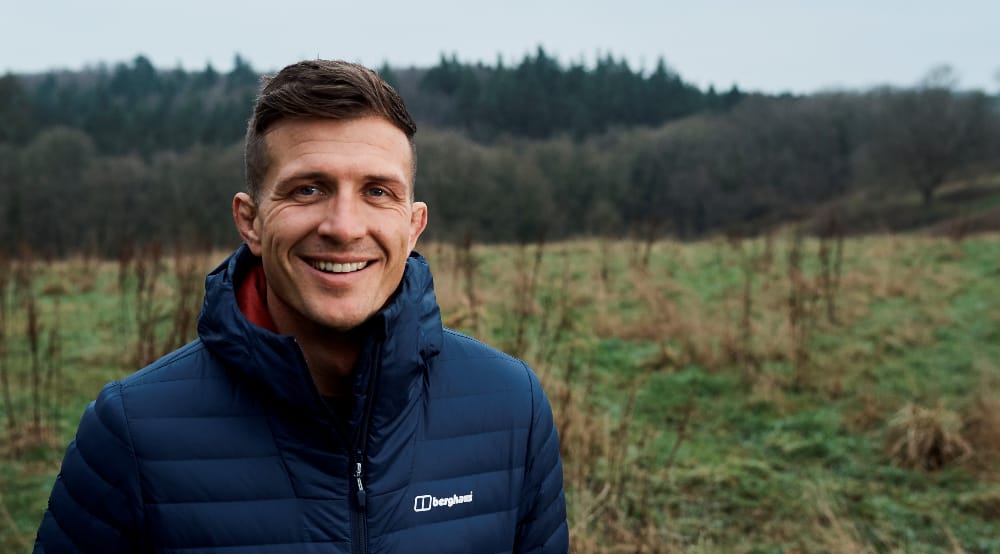
Let us help you with finding an office space
Our experts are here to help take the hard work out of finding your next office space.

Above: Former Wasps player Ed Jackson, who not only beat paralysis, but climbed Snowden a year after his accident.
Our minds are wired to crave the comfort of certainty. When faced with the unknown, how do we keep calm and carry on with our working lives?
Often, we take for granted the running order of things. Within the micro-spheres of our day-to-day roles, we think we know what’s going to happen and when it’s going to happen. But during periods of global uncertainty, we lose our grip. We catastrophise and panic.
Throughout the ages, the world has dipped in and out of chaos and calm. And while uncertainty will eventually subside, it’s likely to shapeshift and return again.
Coping with it should be viewed as a skill we nurture – one that we’ll need to pull out of our mental toolbox throughout the lengths of our careers. So, how should we be dealing with uncertainty in business?
There are a few ways – many of which you can try putting in to practice today.
On the first hot day of 2017, professional rugby player Ed Jackson dived into a pool just three feet in depth, mistaking it for much deeper water. Almost immediately, it rendered him paralysed. After a seven-hour operation, the doctors told him to accept that he probably wasn’t going to walk again.
Reluctant to admit defeat, he spent days staring at his toes, trying to wiggle them, drifting in and out of sleep, then trying again. On day six, much to his own shock, he managed to move a toe.
Fast forward through a series of wins just like these – and plenty of perseverance – not only did he beat paralysis, he climbed Snowdon a year after his accident.
No stranger to crisis, we caught up with Jackson to ask him how business leaders can build up the mental resilience to weather any storm of uncertainty.
He explains: “Putting things into perspective is really important, but as that’s easier said than done, I have an exercise that helps. When I was in hospital, I wrote down a list of all the things I was worrying about, then I crossed off anything I had no control over.
“It makes you realise that there’s not much left to worry about. And there’s no point in worrying about things you have no effect on, because you’ll end up wasting precious time that you could be spending on more productive things”.
While he recommends staying positive and taking pride in everything that’s good, he admits the importance of allowing yourself to feel down about things, rather than trying to fight off any negative emotions. “It’s completely normal to feel low,” he says. “Often, the only thing that makes you feel better is time – and knowing that you won’t feel low forever”.
The famous, “This too shall pass” mantra also applies for stomaching the highs and lows of business. Seasoned investors, for example, know the worst thing to do when the stock market takes a hit is withdraw your money. Remaining in the game means your losses are hypothetical, but the knee-jerk reaction to sell up only realises your losses.
Get your monthly dose of workplace insights, productivity hacks and business leadership ideas - delivered straight to your inbox.
Firms that cut costs faster and deeper than their rivals [had] the lowest probability – 21% – of pulling ahead of the competition when times get better.
As Warren Buffett quipped: “Our favourite holding period is forever”, because in general, “sticking with your investments over the long-term, regardless of market fluctuations, tends to pay off”. Businesses, on the other hand, know that panicking can be just as damaging.
The Harvard Business Review conducted a yearlong project to “analyse [the] strategy selection and corporate performance” of 4,700 companies during the past three global recessions: the 1980 crisis, the 1990 slowdown and the 2000 bust.
The findings were stark: “Firms that cut costs faster and deeper than their rivals [had] the lowest probability – 21% – of pulling ahead of the competition when times get better”, highlighting the damage of aggressively reacting to change, rather than calmly responding to it.
Perseverance, positivity and knowing both ups and downs will pass can be remarkably humbling. As Jackson explains: “What you look at doesn’t matter, what matters is what you choose to see”.
An article published by Headspace on The Wisdom of Uncertainty offers another solution: “Embrace that life will always be uncertain”. For some, this triggers a fresh wave of panic, because it suggests there is no end in sight to the disaster of not knowing.
While humans are impatient by nature, keen for clarity and frankly quite scared of the unknown because it might lead to failure (or worse – rejection), there is a freedom in saying: “I don’t know”.
Suddenly, it becomes perfectly acceptable to hold our hands up and confess that we do not have all the answers – because how could we, when the world around us, the people, beliefs, societies, and even our own minds, are in a constant state of flux?
Accepting the certainty of uncertainty alleviates the pressure of knowing what to do next. It allows us to finally be at ease with our best-kept secret: that we are all ultimately winging it, to the best of our abilities.
As The Wisdom of Uncertainty explains: “There is no shame in not knowing, there is only freedom. An uncertain mind is an open mind. It is a mind which is curious, interested, reflective, and malleable… It offers the opportunity for a considered response to the events of life”.
An article published by The School of Life offers another proposition: “Take things one day at a time”. While it sounds trivial and unrealistic considering the mind’s anxious tendencies, the theory holds plenty of weight. Here’s why…
All of our aspirations are often years away from being achieved – assuming they’ll ever be achieved at all. You want to double your revenue, sell a successful startup and also leave behind a legacy.
But we can only tick off these milestones in the very far away future. Few of the hopes we hold ourselves to can be achieved by the end of the month, let alone by sunset.
If by sunset, we have boosted team morale, or contemplated the name of our future startup, or simply given advice to a colleague, we have had some victories.
But sometimes, life throws unkind scenarios our way which force us to pause our habitual long-term thinking. This could be a serious accident, a breakdown or some terrible news that changes the world.
During these times of crisis, there is only one way to cope – to take things one day at a time. Our hopes become rooted in a slow but steady recovery, confined to the 12 hours before us.
We discover a new type of success: the movement of a single muscle, a therapeutic phone call, a great cup of tea – together with the calming steam that rises from it.
But even for those not faced with a crisis, this short-term thinking can ward off impatiently neglecting the now and chasing monumental goals. It invites us to focus on the small-scale wins of today.
If by sunset, we have boosted team morale, or contemplated the name of our future startup, or simply given advice to a colleague, we have had some victories.
Once we recognise that we have no serious sway on the next decade, “we can stoop to accept with fresh gratitude a few of the minor gifts that are already within our grasp”.
Indeed, the article continues, “how natural and tempting to put one’s faith in the bountifulness of the years, but how much wiser it might be to bring all one’s faculties of appreciation and love to bear on that most modest and most easily-dismissed of increments: the day already in hand”.

Our experts are here to help take the hard work out of finding your next office space.